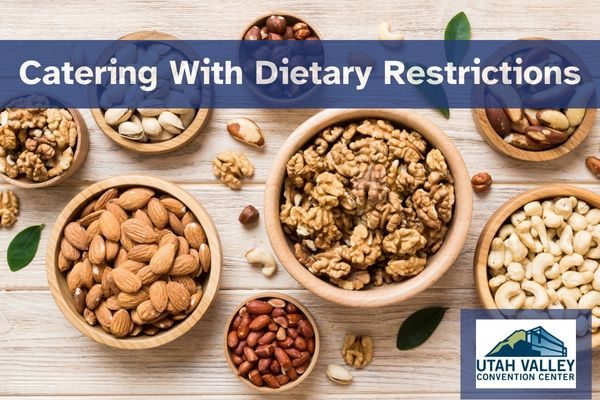The Utah Valley Convention Center, a hub of diverse events in Utah, recognizes the importance of accommodating varying dietary needs among attendees.
Food allergies are prevalent worldwide, affecting approximately 8% of children and 5% of adults in the United States. These allergies can range from mild sensitivities to severe, potentially life-threatening reactions.
Beyond common allergens, the Utah Valley Convention Center also understands the growing demand for catering to diverse and evolving dietary preferences. Vegetarian, vegan, and keto options are no longer niche requests, but increasingly standard expectations. Religious dietary restrictions, such as halal or kosher meals, are also carefully considered to ensure inclusivity for all attendees.
Additionally, the Center recognizes the rising awareness of food sustainability and is committed to incorporating locally sourced, ethically produced ingredients whenever possible. This not only supports local farmers and businesses but also aligns with the growing number of eco-conscious guests.
Frequently Asked Questions When Catering An Event With Dietary Restrictions
When catering an event with dietary restrictions, it’s essential to address various concerns to ensure all guests have a positive experience.
Here are some frequently asked questions that may arise:
Q: What specific allergies or dietary restrictions should we be aware of among the guests?
A: This fundamental question identifies key needs, including vegetarian/vegan, gluten-free, nut-free, dairy-free, religious restrictions (kosher, halal), and any other allergies.
Q: Do guests have preferences for spicy or mild food, and are there diabetic guests requiring low-sugar options?
A: Consider spice levels and sugar content to accommodate diverse preferences and health needs.
Q: Can you provide a detailed breakdown of ingredients used in each dish?
A: Guests with dietary restrictions need ingredient transparency to make informed choices.
Q: How do you prevent cross-contamination in the kitchen to ensure safety for those with allergies?
A: Address food preparation and serving practices to prevent potential cross-contamination.
Q: Can allergen-free or special dietary meals be separately plated?
A: Confirm the feasibility of separate plating or serving options for specific dietary needs.
Q: Are there options for guests with specific dietary needs in each course (appetizer, main course, dessert)?
A: Ensure inclusivity across all courses with diverse choices, often best achieved through buffet-style meals.
Q: Are there any other dietary preferences or aversions to specific ingredients that we should consider?
A: Leave room for open-ended feedback to capture any additional dietary concerns.
By addressing these questions, caterers can better understand and accommodate the diverse dietary needs of their guests, ensuring a positive and inclusive dining experience for everyone.

Common Food Allergies To Be Aware of When Catering
When catering an event, it is important to be aware of common food allergies to ensure the safety and well-being of all guests.
The “Big 8” allergens are responsible for 90% of food allergy reactions in the US: milk, eggs, peanuts, tree nuts, fish, shellfish, soy, and wheat.
Here is a breakdown of prevalent food allergies to be mindful of:
Nuts (especially peanuts and tree nuts): Allergic reactions to nuts can be severe. Ensure that no nuts or nut-based ingredients are present in the menu.
Shellfish: Shellfish allergies are common, and it is crucial to avoid serving any dishes containing shellfish or shellfish-derived ingredients.
Milk and Dairy: Lactose intolerance and dairy allergies are prevalent. Offer dairy-free alternatives for guests with these restrictions.
Eggs: Eggs are a common allergen. Be cautious with dishes containing eggs and provide egg-free options if needed.
Wheat and Gluten: Celiac disease and gluten sensitivity require strict avoidance of wheat and gluten-containing ingredients. Provide gluten-free alternatives.
Soy: Soy allergies are common, and soy is present in various processed foods. Check ingredients carefully to avoid soy-based products.
Fish: Fish allergies can be severe. Avoid using fish or fish-derived ingredients in the menu.
Mustard: Mustard allergies are less common but can still cause severe reactions. Check ingredient labels to avoid mustard-containing items.
Sesame Seeds: Sesame seed allergies are becoming more recognized. Be cautious with dishes containing sesame seeds or sesame oil.
Sulfites: Sulfites are often used as preservatives in various foods and drinks. Check for sulfite-containing ingredients, especially in dried fruits and some processed foods.
Corn: Corn allergies can be challenging to manage, as corn derivatives are present in many food products. Carefully check labels for corn-based ingredients.
Nightshades (tomatoes, potatoes, peppers, eggplant): Some individuals may have allergies or sensitivities to nightshade vegetables. Ensure there are alternatives for those with these restrictions.
Latex (cross-reactivity with certain fruits and vegetables): Some individuals with latex allergies may also experience cross-reactivity with certain fruits and vegetables, such as bananas, avocados, and kiwi.
Glutamate (MSG): Some people may be sensitive to monosodium glutamate (MSG). Avoid using MSG or clearly label dishes that contain it.
With catering it is crucial to communicate with guests in advance, clearly label dishes with potential allergens, and have a system in place to prevent cross-contamination. Additionally, having detailed information about the ingredients used in each dish can help guests with food allergies make informed choices.
How Common Are Food Allergies?
The prevalence of food allergies varies by region and population, but estimates suggest that a significant number of people worldwide are affected by some form of food allergy. These allergies have been increasing in recent years and are influenced by factors such as genetics, environment, and changes in lifestyle and dietary habits.
Additionally, the severity of food allergies can vary, with some individuals experiencing mild reactions while others may have more severe and potentially life-threatening reactions (anaphylaxis).
Looking for a Venue that Takes Dietary Restrictions Very Seriously?
Utah Valley Convention Center can customize catering needs to your event. Use our Event Estimate Tool to get started planning your event.
Conclusion
In ensuring a positive and inclusive experience at the Utah Valley Convention Center, event organizers prioritize understanding and addressing diverse dietary restrictions.
The team’s dedication to dietary inclusivity extends beyond simply avoiding allergens. It reflects a commitment to understanding and respecting the varied preferences and values of its guests, ensuring a positive and welcoming experience for everyone.
Clear communication and detailed menu information underscore the commitment to making events at the Utah Valley Convention Center accessible and enjoyable for everyone, irrespective of their dietary needs.


